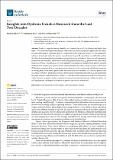Files in this item
Insights into dyslexia genetics research from the last two decades
Item metadata
| dc.contributor.author | Erbeli, Florina | |
| dc.contributor.author | Rice, Marianne | |
| dc.contributor.author | Paracchini, Silvia | |
| dc.date.accessioned | 2022-01-05T13:30:02Z | |
| dc.date.available | 2022-01-05T13:30:02Z | |
| dc.date.issued | 2021-12-26 | |
| dc.identifier | 277243752 | |
| dc.identifier | 4dc3917b-9ef5-4cd0-b38a-ca95c255ae02 | |
| dc.identifier | 85121972364 | |
| dc.identifier | 000757051700001 | |
| dc.identifier.citation | Erbeli , F , Rice , M & Paracchini , S 2021 , ' Insights into dyslexia genetics research from the last two decades ' , Brain Sciences , vol. 12 , no. 1 , 27 . https://doi.org/10.3390/brainsci12010027 | en |
| dc.identifier.issn | 2076-3425 | |
| dc.identifier.uri | https://hdl.handle.net/10023/24599 | |
| dc.description.abstract | Dyslexia, a specific reading disability, is a common (up to 10% of children) and highly heritable (~70%) neurodevelopmental disorder. Behavioral and molecular genetic approaches are aimed towards dissecting its significant genetic component. In the proposed review, we will summarize advances in twin and molecular genetic research from the past 20 years. First, we will briefly outline the clinical and educational presentation and epidemiology of dyslexia. Next, we will summarize results from twin studies, followed by molecular genetic research (e.g., genome-wide association studies (GWASs)). In particular, we will highlight converging key insights from genetic research. (1) Dyslexia is a highly polygenic neurodevelopmental disorder with a complex genetic architecture. (2) Dyslexia categories share a large proportion of genetics with continuously distributed measures of reading skills, with shared genetic risks also seen across development. (3) Dyslexia genetic risks are shared with those implicated in many other neurodevelopmental disorders (e.g., developmental language disorder and dyscalculia). Finally, we will discuss the implications and future directions. As the diversity of genetic studies continues to increase through international collaborate efforts, we will highlight the challenges in advances of genetics discoveries in this field. | |
| dc.format.extent | 14 | |
| dc.format.extent | 545443 | |
| dc.language.iso | eng | |
| dc.relation.ispartof | Brain Sciences | en |
| dc.subject | Dyslexia | en |
| dc.subject | Genetics | en |
| dc.subject | Twin studies | en |
| dc.subject | Molecular genetic studies | en |
| dc.subject | QH301 Biology | en |
| dc.subject | QH426 Genetics | en |
| dc.subject | RC0321 Neuroscience. Biological psychiatry. Neuropsychiatry | en |
| dc.subject.lcc | QH301 | en |
| dc.subject.lcc | QH426 | en |
| dc.subject.lcc | RC0321 | en |
| dc.title | Insights into dyslexia genetics research from the last two decades | en |
| dc.type | Journal item | en |
| dc.contributor.institution | University of St Andrews. School of Medicine | en |
| dc.contributor.institution | University of St Andrews. Centre for Biophotonics | en |
| dc.contributor.institution | University of St Andrews. Biomedical Sciences Research Complex | en |
| dc.contributor.institution | University of St Andrews. St Andrews Bioinformatics Unit | en |
| dc.contributor.institution | University of St Andrews. Cellular Medicine Division | en |
| dc.identifier.doi | 10.3390/brainsci12010027 | |
| dc.description.status | Peer reviewed | en |
This item appears in the following Collection(s)
Items in the St Andrews Research Repository are protected by copyright, with all rights reserved, unless otherwise indicated.

